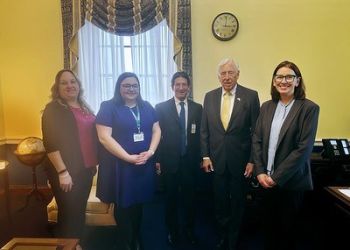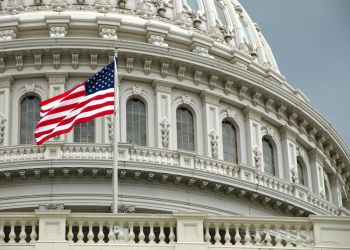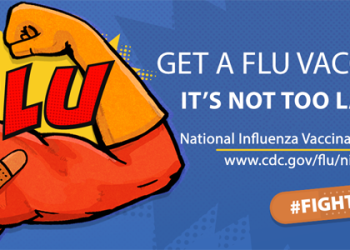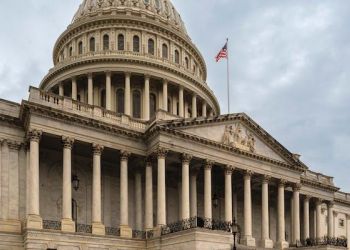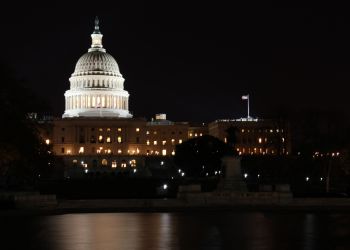Washington, DC, February 11, 2021 – The National Association of County and City Health Officials (NACCHO) sent a letter today to the House Energy and Commerce Committee ahead of the committee’s mark up of their budget reconciliation legislation in support of key provisions to bolster local health departments’ pandemic response. The full letter is here.
On behalf of the National Association of County and City Health Officials (NACCHO) and the nearly 3,000 local health departments across the country, I write to thank you for your efforts to support the public health response to COVID-19. Local health departments have been and continue to lead on the front lines of this response with no end in sight. However, they do so despite great policy and funding challenges.
NACCHO and local health departments appreciate the extensive attention paid to the public health response to COVID-19 in the budget reconciliation package to be considered today by your committee. Below we have cited aspects of the package with particular importance to local health departments.
Public Health Workforce
Public health is a discipline that relies on people and a strong, experienced workforce is critical to achieve our goals. Unfortunately, local health department came into the pandemic at a workforce deficit. Local health departments lost 20% of their jobs (37,000) nationwide after the 2008 recession, and although they have finally started to rebuild, adding 3% of that lost workforce back (6,000 jobs) between 2016 and 2019, the increases have not kept up with demand. Over the same period, the nation’s population increased by 8%. As a result, local health departments have actually lost 21% of workforce capacity since 2008, with the number of full-time equivalent employees dropping from 5.2 per 10,000 people in 2008 to 4.1 per 10,000 people in 2019.
The results of this disinvestment are seen in the COVID-19 response, as local health departments are stretched thin and staff are pulled away from other essential areas in order to respond to the pandemic. Growing and strengthening the paid governmental public health workforce is critical now and long into the future as we recover from the pandemic and must turn our attention back to the many other public health challenges that have fallen out of focus during the pandemic.
The budget reconciliation bill includes $7.6 billion for awards to state, local, and territorial public health departments for staff to serve as case investigators, contact tracers, social support specialists, community health workers, public health nurses, disease intervention specialists, epidemiologists, program managers, laboratory personnel, informaticians, communication and policy experts, and any other positions as may be required to prevent, prepare for, and respond to COVID–19.
We particularly applaud the language in the bill that explicitly permits subawards to local health departments to carry out these activities. Over the course of the response, we have seen great variability in the amount and speed with which public health funds have reached local health departments. Underinvestment and/or delays in obtaining this federal support poses significant challenges to local health departments. Therefore, we further request that this package, if possible, or in any future COVID relief package specifically designate a portion of the funds to go for local health departments to help ensure equity and timely access to these resources so that they can continue to lead on the response in the short term, as well as over the long-term response and through recovery.
We also applaud the focus on and infusion of support for the Medical Reserve Corps, which is the existing way for individuals to volunteer with health departments to respond to pandemics and other emergencies. Last year, the Medical Reserve Corps program, with two-thirds of units administered by local health departments, facilitated 800,000 volunteer hours devoted to the COVID-19 response. While volunteers provide their time free of charge, it takes resources to operate the program for efforts like recruitment, training, management, and supervision. An increase to $100 million for the program would allow for each unit to increase its budget by $100,000 and other units to be organized, exponentially increasing the benefits to local communities and the health and safety of the public.
Vaccine Distribution
The federal government has made significant investments to potentially stop the spread of COVID-19 through development of multiple vaccines. However, to date, we lack the necessary investments in the governmental public health system to ensure rapid and effective deployment and tracking of available vaccine as well as vaccine doses administered. The window to hire and train staff, upgrade data systems, and address vaccine confidence is rapidly closing, and resources are needed now.
Thank you for including an additional $7.5 billion for activities to plan, prepare for, promote, distribute, administer, monitor, and track COVID–19 vaccines in the budget reconciliation bill. We are hopeful that this funding will help support local health departments in their mission to vaccinate the public and coordinate these efforts their communities. Simply put, when local health departments get vaccine, they have shown that they can be incredibly efficient in getting it to individuals in their community. As additional access points to receive vaccine open, it is even more critical that local health departments have the funds and situational awareness to lead the effort in their jurisdictions. This includes not only vaccine administration, but also working with health care providers and other vaccinators, community-based organizations, and other partners to coordinate access to the vaccines and leverage trusted relationships with the public and deliver accurate, culturally appropriate messages about the safety and importance of getting a COVID-19 vaccine. Moreover, these investments are important to build out vaccine infrastructure and track all the necessary information about vaccine administration to identify any safety problems and ensure people receive the necessary doses of vaccine within the recommended timeline. We also appreciate the support within the bill of improved data systems to help with surveillance and ensuring the people at greatest risk for illness and death from COVID-19 have access to vaccination. In your oversight, we urge you to ensure that these investments address challenges at all levels of the governmental public health system (federal, state, and local) and that all levels have access to the critical data they need to ensure an equitable vaccine rollout.
COVID-19 Tracing and Testing
Thank you for including $46 billion for activities to detect, diagnose, trace, and monitor COVID–19 infections and related strategies to mitigate the spread of COVID–19. The governmental public health system, including local, state, and federal public health agencies, is the critical infrastructure our nation must slow the spread of this disease, track our progress, protect particularly vulnerable populations, and preserve critical health care resources. This work is incredibly resource and time intensive, requiring strong funding, staffing, and infrastructure. In addition to providing federal support, NACCHO requests that Congress direct the federal government to publicly track any disbursement of federal COVID-19 response funds down to the local health department level to identify best practices as well as better understand the challenges of getting money to the front lines of the response. Similar tracking language was included in the COVID-19 relief package passed in December 2020 and has already encouraged greater attention to the extent to which funding allocated to the states is passed through to local health departments.
# # #
About NACCHO
The National Association of County and City Health Officials (NACCHO) represents the nation’s nearly 3,000 local health departments. These city, county, metropolitan, district, and tribal departments work every day to protect and promote health and well-being for all people in their communities. For more information about NACCHO, please visit www.naccho.org.



